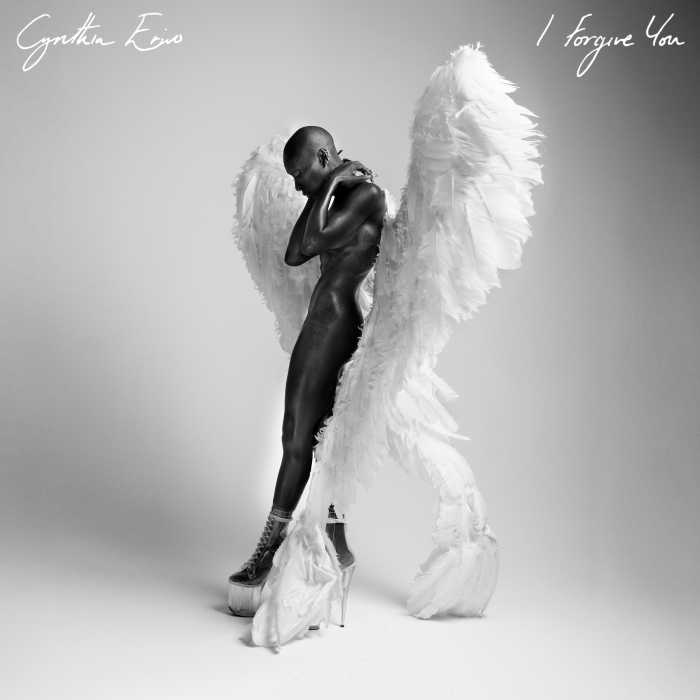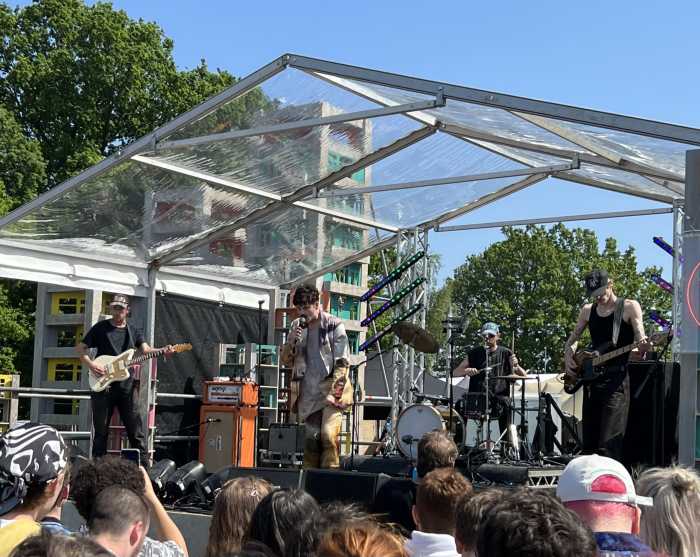Jeffery Roberson aka Varla Jean Merman as Baba in Menotti’s “The Medium.”
Psycho dames and damned psychics stirred up a whole lot of operatic trouble in October and November. Drag diva Jeffery Roberson aka Varla Jean Merman crossed over into operatic divadom, assuming the title role in Menotti’s “The Medium” in a three-week engagement at the Marjorie S. Deane Little Theater a few blocks from Lincoln Center.
Roberson/ Varla scored a success as Baba in Provincetown this past summer and moved with the production to New York. Casting a man in travesti always adds an element of subversive humor and irony to opera — but “The Medium” is a straightforward chiller without an element of camp despite Menotti’s homosexuality. Though Baba is a grotesque and flamboyant figure, Menotti asks the audience to take her descent into paranoia, fear, and finally murder very seriously. The part requires a real operatic voice despite the conversational vocal writing. What might work for the Witch in “Hansel und Gretel” or Baba the Turk in “The Rake’s Progress” creates the wrong tone for “The Medium”.
The discomfort was evident within moments of Roberson’s entrance, when Baba upbraided the mute gypsy boy Toby for “touching her things.” Roberson sang the line “Look at you dressed with silken bangles like a woman” and then looked askance at the giggling audience as if to say, “Yes, I know…” The largely gay male audience was hungry for a camp fest, and born comedienne Varla was ready, willing, and able, but Menotti’s story demanded playing it straight.
Also, Varla’s parody falsetto singing voice fits the contralto range of Baba but lacks real chest tones. When the angry paranoid Baba needed to belt it out with the dark force of an operatic contralto, Roberson only had diffuse shaky head tones. If he sang with too much force, he’d break into his natural male voice. Softer lyrical or conversational tones in the middle range worked best.
Roberson was similarly constrained in his dramatic portrayal. If this Baba became too aggressive in her alcohol-fueled attacks on Toby, Baba’s feminine façade would break. This performance was neither fish nor fowl — not funny enough for camp nor forceful enough for serious drama.
The dramatic and musical values were high. Stefanie Izzo, though looking too mature as most Monicas do, sang with a rich, clear lyric soprano that soared in “Monica’s Waltz.” Adorable twink Edmund Bagnell was a touching Toby who also added some violin obbligato to the piano accompaniment (he is the first violinist of the hunk string quartet Well Strung). It is my theory that Toby is the genuine medium in the opera and is actually channeling the manifestations that terrify Baba.
Music director Elizabeth Hastings performed the piano accompaniment used for student and amateur productions with the right dramatic touch. Donna Drake’s production was simple and effective. The surreal sloping angles of the set decoration would have been more effective if the lighting were not so flat and bright. The hour-long opera was performed as a stand-alone piece with an intermission added after the first séance scene.
Hurricane Sandy found itself another victim when Teatro Grattacielo’s 21st century resurrection of Italo Montemezzi’s opera “La Nave”(“The Ship”) scheduled for October 29 was canceled. “La Nave” (1918) was composed when World War I’s conclusion found Italian nationalism and military fervor at its peak. The opening night at La Scala coincided with a major Italian military victory. “La Nave” was viewed as a pièce d’occasion with a brief shelf life — later productions found little favor. After a Rome revival in 1938, the work disappeared. During World War II, allied bombs destroyed the orchestra parts at Casa Ricordi’s warehouse and it went unperformed and unrecorded for 74 years.
Grattacielo founder and artistic director Duane Printz commissioned new parts from Ricordi, which had kept the autograph orchestral score in safekeeping. Montemezzi’s ship was set to sail again but was scuttled in stormy waters along with much of New York City. The opera in concert was rescheduled on Halloween night, and the performers onstage at Lincoln Center’s Frederick P. Rose Hall likely outnumbered the audience members who were able to attend.
Gabriele D’Annunzio’s abstruse and pretentious libretto in an invented antique Italian dialect is set in sixth century Byzantine Venice. Two families vie for control of the ruined city. Vamp Basiliola seduces both ruling Gràtico brothers, inciting Marco to kill brother Sergio. However, we see very little of this develop — D’Annunzio presents a series of exotic and bizarre tableaux while central plot points and conflicts are obliquely referred to in passing. We watch bad-for-bad’s-sake Basiliola dance with torches, take out a pit full of prisoners with bow and arrows, before she is crucified as a human figurehead on the prow of the titular ship. Supposedly a patriotic parable about Italy reemerging as an international naval power, it plays like a Theda Bara silent with several reels missing.
Montemezzi’s score is a heady mix of post-Romantic impressionism a là Debussy, high Romantic bombast in the Wagnerian manner, and haunting neo-Classicism in the style of Respighi. The orchestral interludes are thrilling, as are several choral episodes. The vocal parts are pure tuneless declamation with no melody and no arias. The singers are asked to power drive forte high notes incessantly over a heavy symphonic orchestration.
Spinto soprano Tiffany Abban (Basiliola) floated lush head tones, missing Basiliola’s fierce diva dementia but never forcing her gorgeous instrument. Erstwhile character singer Robert Brubaker (Marco) pushed his firm but unglamorous tenor mercilessly, turning red with neck muscles bulging. One admired his tenacity and resilience while flinching before each high note attack. Daniel Ihn-kyu Lee and Ashraf Sewailam did what they could with dramatically and musically undeveloped supporting roles.
Conductor Israel Gursky wielded the baton expertly, but both orchestra and chorus needed one or two more rehearsals. Montemezzi considered “La Nave” his masterpiece, but political hindsight reveals disturbing fascistic undertones. The libretto and vocal writing are empty bombast. But its orchestral beauties cannot be dismissed and deserve a fitter vessel.



































